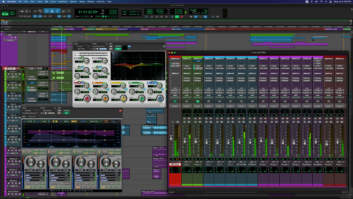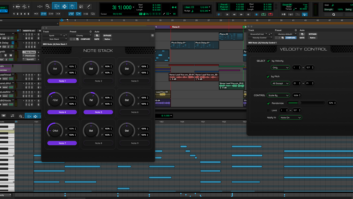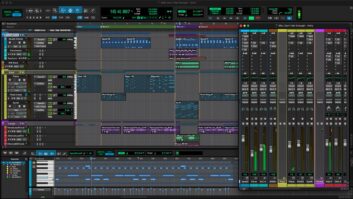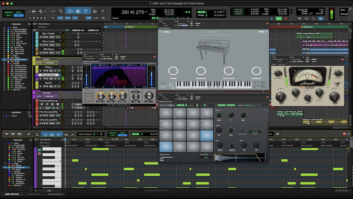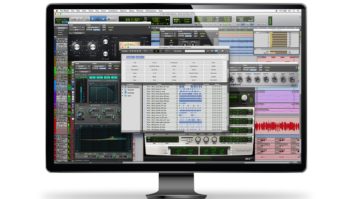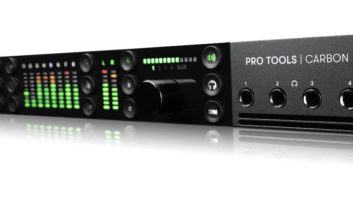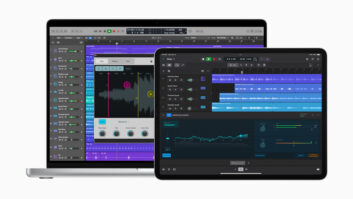Over the last few years there has been a plethora of plug-ins hitting the DAW market. Most of them are very good. But every so often one will come along that is a notch or two above the rest. That’s how I feel about these two new plug-ins for the Pro Tools TDM format.
Trillium Labs’ TL Space 1.1
Convolution reverbs have been the buzz in the world of software-based signal processing. And compared to most traditional reverb boxes, they sound quite different. These reverbs are created by an impulse response (IR) signal that is recorded in a reverberant space and is then convolved with the input signal. Or to put it another way, convolution reverbs are simply sampled acoustic spaces.
The good news is that these reverbs sound beautiful, natural and realistic. The bad news is that they eat DSP resources like a hungry dog. Additionally, many of the early versions of these software plug-ins had problems with latency and inadequate parameter controls.
Trillium Labs has addressed many of these issues with TL Space. For example, users with Accel cards experience zero latency while other TDM users clock in a minuscule three samples. This PC and Mac program supports TDM, HTDM, RTAS and AudioSuite formats. Accel users may choose between Short, Medium and Long reverbs. Other TDM folks are limited to Short reverbs only. The Short reverbs have a maximum sample rate of 48 kHz with a reverb time up to 1.1 seconds. Medium and Long reverbs go up to 2.3 and 3.4 seconds respectively with sampling rates to 96 kHz. Interestingly, HTDM, RTAS and AudioSuite supports reverb times up to 10 seconds!
The TL Space plug-in window is a design in simplicity. Menu buttons for Levels, Delays, Early Reflections, Reverb and Decay each have their own sliders. To change the reverb’s predelay, for example, hit the delay button and move the predelay slider. It’s that simple.
Users can also view the IR waveform in real time and save settings as Snapshots. The advantage of IR Snapshots is that they are optimized to load much quicker than presets. Up to 10 snapshots may be stored in a session, however, they will increase the size of the file.
So how does this plug-in sound? It’s really incredible! I’ve been using it as the main reverb for a new CD project with singer and multi-instrumentalist, Jayne Demakos. Her vocals sound sweet and very spacious. A little bit, however, goes a long way. Like me, you will probably need to tweak the parameters to perfection.
Trillium Labs’ TL Space comes bundled with over 700 megabytes of impulse responses in mono, stereo and surround formats. In addition, the company has added 24 new IR sets to its online library. These include churches, concert halls, rooms, vintage analog reverbs and other types of effects. And if that is not enough, simply record your own impulse responses and load them into TL Space.
Trillium Labs TL Space Native Edition – $495 Trillium Labs TL Space TDM Edition – $995
Contact: Digidesign at 800-333-2137, www.digidesign.com, www.tllabs.com.
SoundToys EchoBoy 1.0
Are you looking for some new and creative sounds with attitude? How about fat analog echoes, rich and gooey choruses and pristine spacious delays? If so, you’ve come to the right place. The audio alchemists at SoundToys have released their ultimate echo/delay machine – EchoBoy.
The plug-in is only available with Mac OSX in TDM, RTAS and AudioSuite formats. Users of SoundToys’ UltraEFX plug-ins will recognize the same “simulated” effects-rack interface. Adorning the screen’s background is a variety of 3D-looking knobs, buttons, switches and displays. Hey, they even include rack screws in each corner!
Navigation around the plug-in is quite simple. The interface is comprised of one main window where most of the action takes place. Tweak-heads will be pleased to find additional pop-up menus with more parameter options. Of special interest are 31 different “Echo-Styles.” These include models from vintage stomp boxes and classic tape machines to original SoundToys effects. What makes this feature interesting is that once a preset is edited, users can try different “Echo Styles” without changing the delay setup. In addition, there are different types of modes such as Single Echo, Dual Echo, Ping-Pong, and Rhythm Echo. This provides a myriad of choices.
Another key feature is Tempo control. Users may click the tap tempo button to establish the BPM, enter the values manually or use Pro Tools’ MIDI clock. Things get even more interesting with the Groove knob. Turn it counter-clockwise and the echoes have a laid-back shuffle feel. Or turn it clockwise to create a rhythmic swing that ‘pushes’ the feel. The more you turn the Groove knob, the greater the effect. Very cool indeed!
The nuts and bolts of EchoBoy are the 300 presets in 13 different categories. SoundToys stretches the concept of echo to include presets like Oil Tanker, Galloping Tape, Space Goo and Beat Wiper. While many of the esoteric presets will appeal to sounds designers, there are plenty of utilitarian sounds for everyday use. And like many of SoundToys’ other plug-ins, EchoBoy has a distinct and rich analog sound.
While EchoBoy’s delays are right on, the plug-in imparts its own 66-sample delay (at 44.1 kHz). This latency translates to about a 1.38ms. While this could be problematic for a drum pattern, it may be OK for a synth pad. Remedying this is no problem. Simply shift the track manually or use Pro Tools’ delay compensation.
I fired up EchoBoy with an electric guitar and was blown away by the sound quality and excellent presets. This plug-in will work equally well with most anything thrown at it. Try it on vocals, keyboards or drums. Since I do a lot of sound design work, EchoBoy dished up an unlimited palette of sounds. But whatever kind of studio you have, this plug-in will surely enhance your projects. Don’t delay with this one!
SoundToys EchoBoy 1.0 – $495
Contact: Soundtoys at 877-266-5339, www.soundtoys.com.
